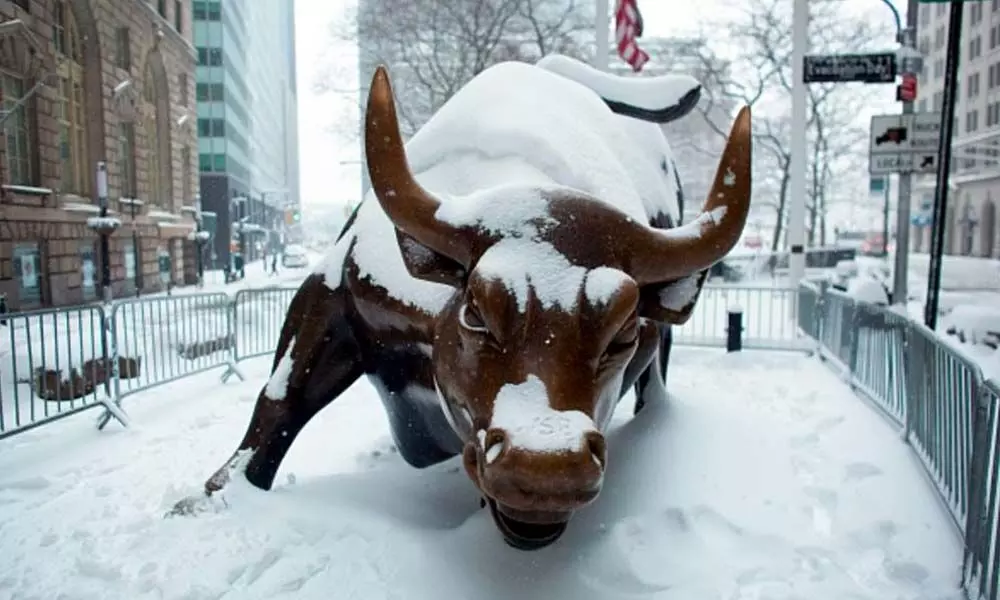Investors are too exuberant
Remember what we learned during the throes of the pandemic: the economy was getting worse but stocks were going up. All through the rally, the talking heads repeated the cliché that the stock market is not the economy - and it’s not. Almost every recession in history, though, has been accompanied by a decline in the stock market
image for illustrative purpose

Ask almost anyone on Wall Street these days what to expect in the months to come and the answer is always the same: once the Covid-19 vaccines are mostly distributed, people will begin to travel in unprecedented numbers, retail sales will skyrocket and the economy will boom. The consensus seems to be for the economy to expand around 6 per cent in the second half of the year. They say the risk is not that growth will fall below that number, but come in much stronger. I haven't found anyone willing to take an opposing view.
But there is a general principle of investing that you want to buy the rumour and sell the news. Hedge funds and big institutions have been buying the rumour of a coming economic surge for some time now, and the trade is very crowded and nearly fully priced, as evidenced by the shares of companies owning airlines, cruise ships and theme parks. What will happen once the boom materializes?
There is a chance that stocks actually drop in the second half of the year even as people dine out, throw parties and spend the savings that they accumulated during the pandemic. Remember what we learned during the throes of the pandemic: the economy was getting worse but stocks were going up. All through the rally the talking heads repeated the cliché that the stock market is not the economy - and it's not. Almost every recession in history, though, has been accompanied by a decline in the stock market.
That works both ways. If the stock market is not the economy, it is possible for stocks to go down while the economy vastly improves. Such an outcome now is likely, even probable, regardless of what the Federal Reserve does or whatever fiscal stimulus the government is contemplating. Why? Sentiment. More important than charts, data and fundamentals are how people feel about stocks and how they're positioned. The pattern where an idea gradually becomes the consensus just as the thesis makes the most sense appears over and over again in markets. This always leads to something called the caboose: the person who is the last to learn of a trade and piles in at the highs.
Sentiment is measured in any a number of different ways in the stock market. An old standby is the American Association of Individual Investors sentiment survey, whose current reading is 47 per cent bulls and 25 per cent bears. That 22-point difference is above the long-term median of 6 points, showing an extreme reading. The idea is that individual investors are frequently wrong on stocks, getting bullish on the highs and bearish on the lows. February is on track to be a $2 trillion month in penny stock volume. Equity and index call option volume are at all-time highs. Sentiment does not get any hotter.
All bulled up
Linear thinking gets investors in trouble. It's why so many liquidated their portfolios at the lows back in March, because that is when the prospects for the economy seemed the worst, when they should have followed the Costanza principle. That's from the Seinfeld television episode where George Costanza learns that if he does the opposite of what his instincts tell him to do, he has a better outcome.
Costanza is everywhere in the markets. Ever wonder why stocks rally when the government releases a terrible unemployment number? It's not because job losses are bullish, but because of the second-order effects: the results raised the odds that the Fed eases monetary policy and provides more liquidity, which is bullish for stocks. If you ever find that you are thinking linearly, and trading the first-order effects of an event, you might be on the wrong side of the trade.
The stock market is a game of 'early bird,' in that if you buy before everyone else and sell before everyone else, you will generally make money - aside from the stock market's function of capital allocation and price discovery. Buying before everyone else usually means buying when a trade makes little to no sense or when the prospects of an idea are the bleakest. A good example is energy stocks back when oil prices briefly went negative last year. That turned out to be a great time to buy energy stocks, and all commodities generally. You also have to sell before everyone else, which usually means selling right when the bullish thesis is at its most compelling, which is at the highs. (Bloomberg)

